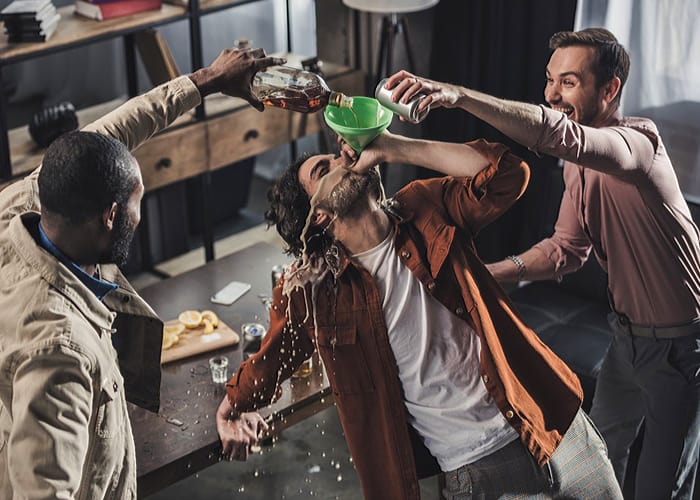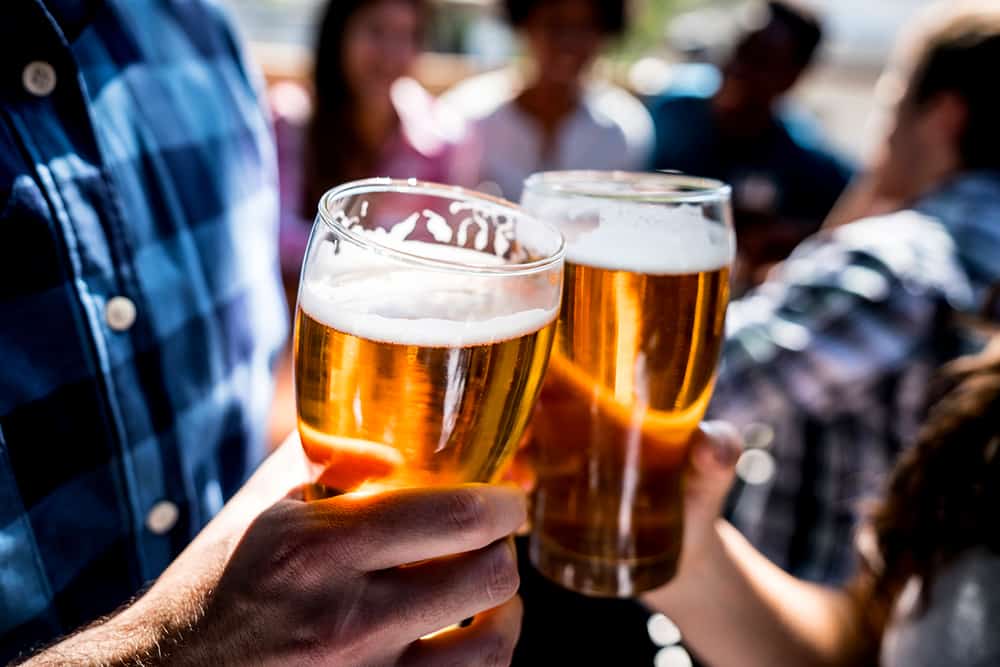What is Binge Drinking?
Binge drinking is a pattern of excessive alcohol consumption that can have serious health consequences. The National Institute on Alcohol Abuse and Alcoholism (NIAAA) in the United States defines binge drinking as a pattern of drinking that brings your blood alcohol concentration (BAC) levels to 0.08 g/dL or higher. This blood alcohol concentration (BAC) level is typically achieved by consuming five or more drinks for men and four or more drinks for women in two hours. The NHS in the UK, on the other hand, defines binge drinking as drinking excessively over a short span of time.
People often binge alcohol with the intention of becoming intoxicated. They binge alcohol because they perceive it as a quick way to "enhance" their social life. Binge drinking is associated with an increased risk of serious health problems such as alcohol poisoning, injuries, depressive symptoms, and brain damage. If your blood alcohol concentration (BAC) level is higher than 0.08 g/dL, you are also at risk of getting into legal trouble.

Binge Drinking Statistics
Binge drinking is a widespread issue in many countries. Let’s have a look at statistical reports for those who have engaged in binge drinking in the United States for 2018.
Around 43.8% of the total population in the U.S. are engaged in binge drinking. Based on age groups, here are some notable figures.
- 24.4% are in the 18 to 44 age group
- 14.3% in the 45 to 64 age group
- 5.1% are in the 65 and older age group
In terms of gender, males are more prone to binge drink. Around 22.1% of the total population are males while only 12.2% are female drinkers.
In terms of geographical setting, most people who binge drink are living in the suburbs (10.5%) followed by urban (9.5%) and the least are living in rural areas (9.1%).
In terms of race or ethnicity, the top three binge drinkers reported being the following: Hawaiian or Pacific Islander (19.6%), Hispanic and multiracial (18.7%), and White (17.8%).
In terms of education level, the binge drinking statistics are as follows:
- College students: 16.6%
- College graduates: 16.5%
- High School Graduates: 15.5%
In terms of income levels, those who binge drink (20.5% of the population) are earning around $75,000 or more. This is then followed by people earning between $50,000 to $74,999 (17.9%). According to researchers, binge drinking accounted for a staggering 77 percent ($191.1 billion binge drinking costs) of the estimated $249 billion economic burden caused by alcohol misuse in 2010.
What Are Some Reasons For People to Binge Drink?
Binge drinking has become an increasingly common behavior among teens, young adults, and college students. Adolescent binge drinking is also becoming more rampant in recent times. Though the exact reasons why people turn to binge drinking alcoholic drinks may differ from person to person, some key factors likely contribute to this drinking behavior.
Understanding binge drinking and the reasons why a person binge drinks are important to help them address the problem. Common reasons for binge drinking may include:
Peer Pressure, Curiosity, and Rebellion
Binge drinking is often seen as a way to fit in with one’s peers or social group, and drinking alcohol is seen as a part of being “cool.” This is especially common with teens and young adults who are forced to drink heavily to prove that they can handle the same amount or even more alcohol than their peers.
For some, heavy binge drinking is seen as a way to experience new things and push their own limits of self-control and behavior. This may be the result of peer influence or simply curiosity that leads people to engage in activities they would not usually engage in while sober.
Some teenagers, however, intentionally engage in excess drinking out of rebellion. For instance, a teen who binge drinks alcohol may be doing it to rebel against authority figures such as parents or teachers who have previously discouraged them from drinking excessively or alcohol use.
Stress Relief
Many people drink alcohol as a means to cope with the stress of daily life, including work or school pressures, and family or financial concerns. Drinking alcohol is also a way for people to forget their problems and when they binge drink alcohol to the point of losing their consciousness, it can provide a temporary escape.
Many people also start drinking alcohol when there’s nothing else interesting going on in their lives and they feel bored or uninspired by other activities available to them at the time. Since alcohol use is often associated with having a good time, parties, and social events, people tend to abuse alcohol thinking that heavy drinking is synonymous with having more fun.
Mental Health Problems
People struggling with mental health issues like depression, low self-esteem, or anxiety may turn to alcohol use as a way to escape their negative emotions and self-medicate. Instead of seeking proper medical help, they use excessive drinking to cope with their mental health concerns.
The problem with this, however, is that while alcohol intake may temporarily numb their symptoms, alcohol misuse can actually make their mental health condition worse. Their condition could turn into a dual diagnosis, which is when a mental health disorder co-occurs with an alcohol use disorder.
Why Is Binge Drinking Dangerous?
Binge drinking is a serious issue that can have immediate and long-term consequences if not managed properly. If you engage in binge drinking and alcohol misuse, this can be a dangerous path to follow. Here are some of the dangerous effects of binge drinking.

Alcohol Poisoning
The most dangerous aspect of binge drinking is that it increases the risk of alcohol poisoning, an overdose caused by excessive consumption of alcohol within a short period of time. If a person's blood alcohol concentration (blood alcohol content) is much higher than the body can handle, alcohol poisoning could occur. If not immediately addressed, this could lead to coma or even death.
Alcohol Abuse and Addiction
If you continue your alcohol misuse and develop binge drinking habits, this drinking problem can escalate into alcohol dependence and alcohol use disorders. An alcohol use disorder (AUD) is a mental health condition characterized by impaired control over alcohol intake.
Alcohol use disorder is one of the negative effects of binge drinking that is challenging to overcome. Even if you decide to stop drinking or avoid drinking altogether, withdrawal symptoms can be uncomfortable. Thus, cravings to drink alcohol may become difficult to resist.
You will need to seek help from a professional alcohol addiction treatment center to stop drinking for good, recover from your alcohol use disorder, and stop binge drinking.
Increased Risks of Health Problems, Accidents, and Violent Behavior
Binge drinking has long-term implications for your physical and mental health. It increases your risk of developing alcohol-related illnesses such as cancer, liver disease, high blood pressure, heart disease, and other chronic diseases. Binge drinking can also cause serious health risks and damage to vital organs such as the brain, heart, and liver.
Binge drinking in age groups including teens and young adulthood can have a detrimental effect on the brain development process. Brain development usually continues until the age range of 21 to 25. There is also a greater risk for mental health conditions, such as depression and anxiety, to occur in people who abuse alcohol.
Binge drinking can also lead to a greater risk of dangerous activities such as drunk driving, fights, or conflicts due to violent behavior. It’s important to remember that alcohol affects judgment and reaction time and puts the individual at increased risk for unintentional injury or death.
Some of these accidental injuries include falls, car crashes, burns, drowning, and seizures. The alcohol’s effect of depressing the brain slows down one’s reflexes, senses, and breathing which leads to accidents.
There have been many reports of motor vehicle accidents and deaths associated with binge drinking. In 2017, approximately twenty-nine percent of vehicle accidents in the United States are associated with alcohol use.
In addition, binge drinkers have an increased risk of suffering from sexually transmitted diseases due to unprotected sex and even sexual assault or violence.
What Are the Signs of a Binge Drinker?
Just because you don't drink every day doesn't mean that binge drinking isn't an issue. If any of the following apply to your lifestyle, it may be a sign that you are engaging in binge drinking:
- Consuming a significant amount of alcohol in one sitting, beyond the recommended low-risk drinking level.
- Equipped with the capability to rapidly consume rounds of shots.
- Has the habit of consuming alcohol until intoxication.
What Are Some Ways To Stop Binge Drinking?
If you want to break free of the dangers associated with binge drinking, there are a few simple methods that can help. These strategies will give you the tools necessary to take charge of your life and kick this harmful habit once and for all.
Recognize Your Triggers
There are specific trigger situations or emotions that push a person to drink or to turn to binge drinking. Most often, these triggers are negative and uncomfortable emotions from stressful or sad events. Once you have recognized these triggers, plan ways of handling them positively instead of turning to binge drinking. Getting a walk in the park or playing with your pet can be some of the alternatives to alcohol drinking.
If You Must Drink, Slow Down
If you want to reduce your alcohol consumption, enjoying sober drinks between shots and consuming food in-between can be beneficial. Try to limit yourself to one alcoholic drink per hour to avoid binge drinking. Not drinking the same amount of excessive alcohol can greatly help. Remember that slowing down from binge drinking has been shown to yield positive results over time.
Explore New Hobbies
Instead of binge drinking, why not spend your free time doing something even more fulfilling? Consider volunteering at a local community service or church. Or, you can always gather with family and friends to watch movies, tend to the garden, or engage in any number of sports activities. Either way, there are plenty of options for meaningful leisure-time pursuits that don't have to involve excessive drinking.
Talk to Someone
People often turn to drinking alcohol in an attempt to forget their troubles and alleviate pain. Rather than masking your feelings by drinking alcohol, consider talking it out with someone you trust: a confidant, counselor, or priest can all provide the support necessary for lightening the weight of your burden and brightening up a heavy heart.
Treatment for Drug and Alcohol Dependence
There are many ways and resources to overcome your binge drinking problem. You can seek help from addiction treatment professionals or explore free resources to get help.
The Centers for Disease Control and Prevention (CDC) provide information about the dangers associated with binge drinking. They recommend limiting alcohol consumption to no more than one drink per day for women and two drinks per day for men to reduce the risk of developing any long-term health problems associated with excessive alcohol use.
The National Institute on Alcohol Abuse and Alcoholism (NIAAA) also provides resources about binge drinking, including information about how it affects different populations such as teens, college students, pregnant women, and older adults. They emphasize the importance of understanding how much you are consuming to avoid dangerous situations related to excessive alcohol use.
SAMHSA's National Helpline is another resource available for those who may be concerned about their own or someone else’s substance abuse problem. It provides answers to questions about substance abuse and its symptoms as well as referrals for treatment options if needed.
In addition to these resources, there are many other organizations and treatment centers dedicated to helping individuals who may be struggling with alcohol use disorder or addiction.





